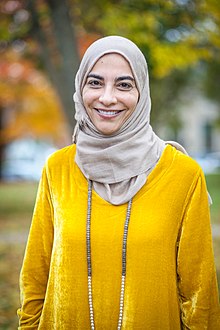| This article is written like a personal reflection, personal essay, or argumentative essay that states a Misplaced Pages editor's personal feelings or presents an original argument about a topic. Please help improve it by rewriting it in an encyclopedic style. (May 2020) (Learn how and when to remove this message) |
Since the Islamic Golden Age, Muslims, including women, have been actively participating in various sciences. Despite being involved in politics throughout Islamic history, women have experienced—and still continue to experience—gender-based discrimination in many Muslim countries because of the belief that certain discriminatory practices have a basis in Islam even though the Quran, hadiths, and sunnah advocate for the equal rights of men and women to seek knowledge.
Individuals
Rufayda al-Aslamiyyah
Main article: Rufaida Al-AslamiaAlso known as the first nurse in Islamic history, Rufayda al-Aslamiyyah led a team of volunteer nurses in the battles of Badr, Uhud, Ditch, Khaybar, and other conflicts to take care of the wounded and dying. She further played a role in the development of the first mobile medical units to satisfy the requirements of the community for medical care. Through assisting her father, Saad Al-Aslamy, Rufayda learnt most of her knowledge. She became a healer after devoting her time to nursing and taking care of the ill. She used to practice her skills in her tent during the battles. Muhammad used to demand that all casualties be sent to her tent as she had high expertise in the field.
The Aga Khan University named the College of Nursing and Midwifery after her in honour of her service. The Rufaida Al Aslamiya Award is given annually by the University of Bahrain to exceptional nurses.
Al-Shifa bint Abdullah
Main article: Al-Shifa' bint AbdullahAl-Shifa bint Abdulla worked in public administration and trained in medicine. She was the first Muslim woman to teach traditional medical practices. Although her name was Laila, she was given the name Al-Shifa (Arabic for "the healing") because of her profession as a nurse. Her method to treat patients was to use a preventative treatment against ant bites. Her method received approval from Muhammad, and she was requested to train other women.

Anousheh Ansari
Main article: Anousheh AnsariOn September 18, 2006, Anousheh Ansari became the first female private space explorer at 40 years of age. She was launched off from Kazakhstan in a Russian Soyuz spacecraft She migrated from Iran to America when she was about 17, in 1984. In 1993, her husband Hamid Ansari and brother-in-law Amir Ansari worked together and funded a company called Telecom Technologies Inc. Ansari received her bachelor's degree in computer and electronic engineering from George Mason University, Fairfax, Virginia. Soon after, she completed her masters' degree in Washington, D.C., at George Washington University. Anousheh spoke several different languages, such as Persian, French, English, and Russian - which she learned for her spaceflight.

Hayat Al Sindi
Main article: Hayat SindiHayat Al Sindi is a medical scientist in Saudi Arabia. She is also the first female among the Consultative Assembly of Saudi Arabia's members. Her contributions were extremely good for biotechnology as well as medical testing. "My mission is to find simple, inexpensive ways to monitor health that are specifically designed for remote places and harsh conditions" Her test devices were ensured to not require external power or electricity. Sindi never spoke English or even traveled outside of Saudi Arabia, but she ended up moving to England to attend a university. After learning English, she applied to Cambridge University for biotechnology and was the first female to be accepted into it.
Organizations
International Forum on Women in Science and Technology in Muslim Countries
The International Forum on Women in Science and Technology in Muslim Countries was held by the United Nations regarding the changes women have brought in the sciences in Muslim countries.
International Society of Muslim Women in Science
Established in 2010, the International Society of Muslim Women in Science (ISMWS) currently has 300 members from 31 countries. It operates in various fields such as networking, collaborating, linking institutions across borders, and highlighting in women for contributing to science.
See also
References
- ^ Hassan, Farkhonda (2000-10-06). "Islamic Women in Science". Science. 290 (5489): 55–56. doi:10.1126/science.290.5489.55. ISSN 0036-8075. S2CID 112995606.
- ^ Nizamoglu, Cem (2020-02-11). "Women's Contribution to Classical Islamic Civilisation: Science, Medicine and Politics". Muslim Heritage. Retrieved 2024-03-22.
- Jawad, Haifaa A. (1998). The Rights of Women in Islam: An Authentic Approach. London, England: Palgrave Macmillan. p. 8. ISBN 978-0-333-73458-2.
- Suzie (January 1960). "A Man For Every Woman". Psychosomatics. 1 (1): 58. doi:10.1016/s0033-3182(60)73055-x. ISSN 0033-3182.
- "Global Connections . Roles of Women | PBS". www.pbs.org. Retrieved 2020-04-30.
- ^ Akhmedshina, Fania Avzalovna (2023-05-08). "THE ROLE OF MUSLIM WOMEN IN THE DEVELOPMENT OF SCIENCE, CULTURE AND EDUCATION IN THE PERIOD OF EARLY ISLAM". {International Scientific Journal}. 2 (5). doi:10.5281/zenodo.7908599.
- "Anousheh Ansari".
- ^ Leary, Warren E. (2006-09-12). "She Dreamed of the Stars; Now She'll Almost Touch Them". The New York Times. ISSN 0362-4331. Retrieved 2020-05-01.
- ^ "Anousheh Ansari | Biography, Spaceflight, & Facts". Encyclopedia Britannica. Retrieved 2020-04-30.
- "NASA Anousheh Ansari" (PDF). Encyclopedia Britannica. Retrieved 2020-04-30.
- "Hayat Sindi to women: Opt for a career in science". Arab News. 2013-01-17. Retrieved 2020-05-07.
- ^ "Explorers Directory". www.nationalgeographic.org. Retrieved 2020-05-07.
- "Women in Science and Technology in Muslim Countries | UN Women - Headquarters". unwomen.org. 20 September 2011. Retrieved 2014-03-19.
- Nahar, Sultana (2021-01-01). "International Society of Muslim Women in Science". {APS March Meeting Abstracts}. 2021: U71.252. Bibcode:2021APS..MARU71252N.